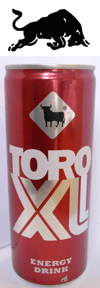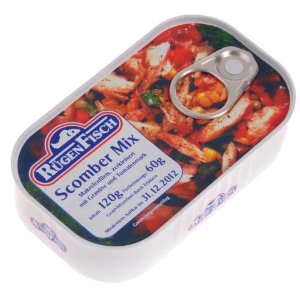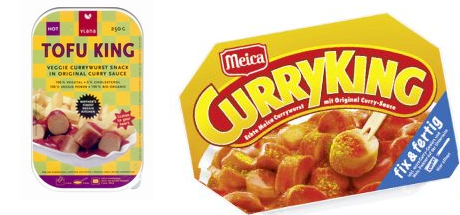Hof 's-Gravenhage 20 september 2011, LJN BS8933 (Grupo Osborne en Menken Drinks B.V. tegen Red Bull GmbH)
 Met dank aan Arvid van Oorschot, Freshfield Bruckhaus Deringer LLP.
Met dank aan Arvid van Oorschot, Freshfield Bruckhaus Deringer LLP.
In navolging van IEF 8062. Merkenrecht. Afvullingsjurisprudentie. IPR. De van de sherry bekende Osborne-stier maakt samen met woordelement TORO en XL (toch) geen gebruik van het woordmerk BULL voor energydrinks van RED BUL, geen verwarringsgevaar, geen verwatering, aantasting of meeliften.
Vanaf 1995 tot 2005 is Osborne opgetreden als exclusief distributeur van Red Bull in Spanje. Menken vult voor Osborne de blikjes af. Osborne en Menken stellen dat de rechtbank een onjuiste juridische maatstaf hanteert door het onderdeel XL uit te sluiten van de beoordeling, dit is echter niet uitgesloten, maar bij de globale indruk zal XL voor het gemiddelde publiek niets anders zijn dan een normale beschrijving van, in dit geval, de (extra grote) kracht van de drank.
Er is geen sprake van ongerechtvaardigd voordeel trekken door Osborne (r.o. 5.18). Er bestaat ook geen aanwijzing dat Osborne met haar teken probeert in het kielzog van Red bull te varen, is het gebruik van één normale bordeau-rode kleur opvallend afwijkend van de blauw-zilveren vlakken van Red Bull en immers vond de introductie plaats in Spanje, niet in de Benelux.
Menken trekt geen ongerechtvaardigd voordeel of doet afbreuk aan het onderscheidend vermogen of de reputatie van het merk. "Immers, vast staat dat zij [Menken] op geen enkele wijze betrokken is bij de distributie - of anderszins verhandeling - van de van het geding zijnde teken voorzienen energiedranken. Zij biedt louter een dienstverlening aan Osborne aan: het afvullen van blikjes waarop het teken staat."
Hof vernietigt het vonnis IEF 8062 en doet opnieuw recht: wijst de vorderingen van Red Bull af, doorhaling van woordmerk BULL, veroordeelt Red Bull in kosten van Osborne en Menken zowel kosten in kort geding als bij het hof ex 1019h Rv.
4.2. Deze grief treft geen doel. In de visuele vergelijking tussen de twee elementen stiertekening en TORO-woord in het teken komt het hof, evenals de rechtbank, tot het oordeel dat deze elementen in gelijke mate domineren. Door het zwart van de stier, het zilverkleurige vierkant op de rode basiskleur en de plaatsing apart boven en los van de lettert, domineert het vierkant met de afbeelding van de stier visueel in gelijke mate als het woordelement TOTO.De totaalindruk die doro het teken wordt opgeroepen, wordt gedomineerd door deze twee onderscheidende elementen. Ook het hof zal daarom, evenals de rechtbank, niet alleen rekening houden met het teken en de merken in hun geheel, maar daarbij ook met de omstandigheid dat teken en merken dominerende beeldelementen hebben.
5.20 Op grond van het voorgaande gaat het hof ervan uit dat Osborne met de plaatsing van de stier in haar teken op energiedranken haar eigen goodwill wenst te gebruiken en niet de goodwill van Red Bull. Een en ander getuig niet van oneerlijke concurrentie. Het hof kan dus niet vaststellen dat Osborne in het kielzog van (een) merk(en) van Red Bull probeert te varen om van de aantrekkingskracht, de reputatie en het prestige daarvan te profiteren of om zonder enige financiële vergoeding en/of zonder daarvoor passen inspanningen te moeten leveren voordeel te halen uit de commerciële inspanningen die Red Bull heeft geleverd om het imago van haar merken te creëren en te onderhouden.
Lees het arrest hier (pdf / LJN / opgeschoonde pdf)
Merkenrecht. Gemeenschapsbeeldmerk Mangiami. Nietigheidsprocedure. Toelaatbaarheid van nieuw bewijsmateriaal. Er is hier sprake van complementair bewijs inzake gebruik en er is, gezien de jurisprudentie, geen sprake van een systematische verwerping van dit type bewijsvoering. Beslissing OHIM vernietigd.
 In navolging van conclusie A-G Jääskinen IEF
In navolging van conclusie A-G Jääskinen IEF  Met gelijktijdige dank aan Niels Mulder,
Met gelijktijdige dank aan Niels Mulder,  In navolging van IEF
In navolging van IEF  Met gelijktijdige dank aan Arvid van Oorschot en Hesther Lakerveld,
Met gelijktijdige dank aan Arvid van Oorschot en Hesther Lakerveld,  Merkenrecht. Gemeenschapsmerk. Absolute weigeringsgrond beschrijvend karakter scomber = makreel. Nietigheidsprocedure, beroep door de houder van het communautaire woordmerk „
Merkenrecht. Gemeenschapsmerk. Absolute weigeringsgrond beschrijvend karakter scomber = makreel. Nietigheidsprocedure, beroep door de houder van het communautaire woordmerk „ Merkenrecht. Gemeenschapsmerk. Absolute weigeringsgrond:
Merkenrecht. Gemeenschapsmerk. Absolute weigeringsgrond:  Met dank aan Arvid van Oorschot,
Met dank aan Arvid van Oorschot,  Met gelijktijdige dank aan Menno Heerma Van Voss,
Met gelijktijdige dank aan Menno Heerma Van Voss,  Merkenrecht. Gemeenschapsmerk. Oppositieprocedure tegen aanvrage
Merkenrecht. Gemeenschapsmerk. Oppositieprocedure tegen aanvrage 





















































































